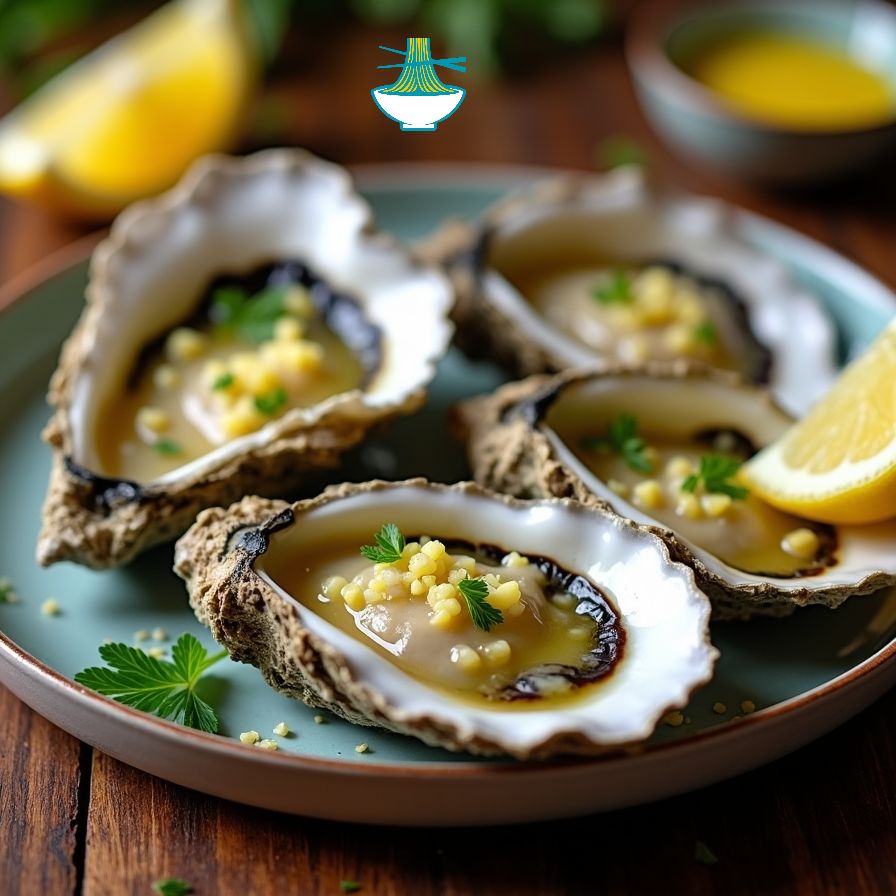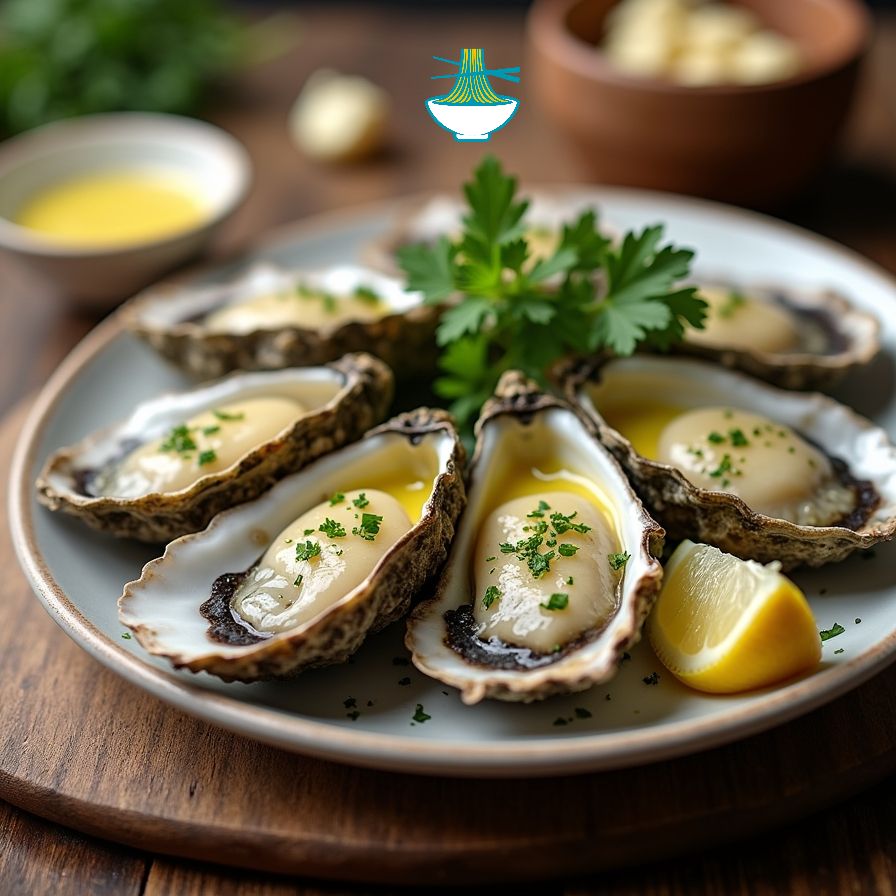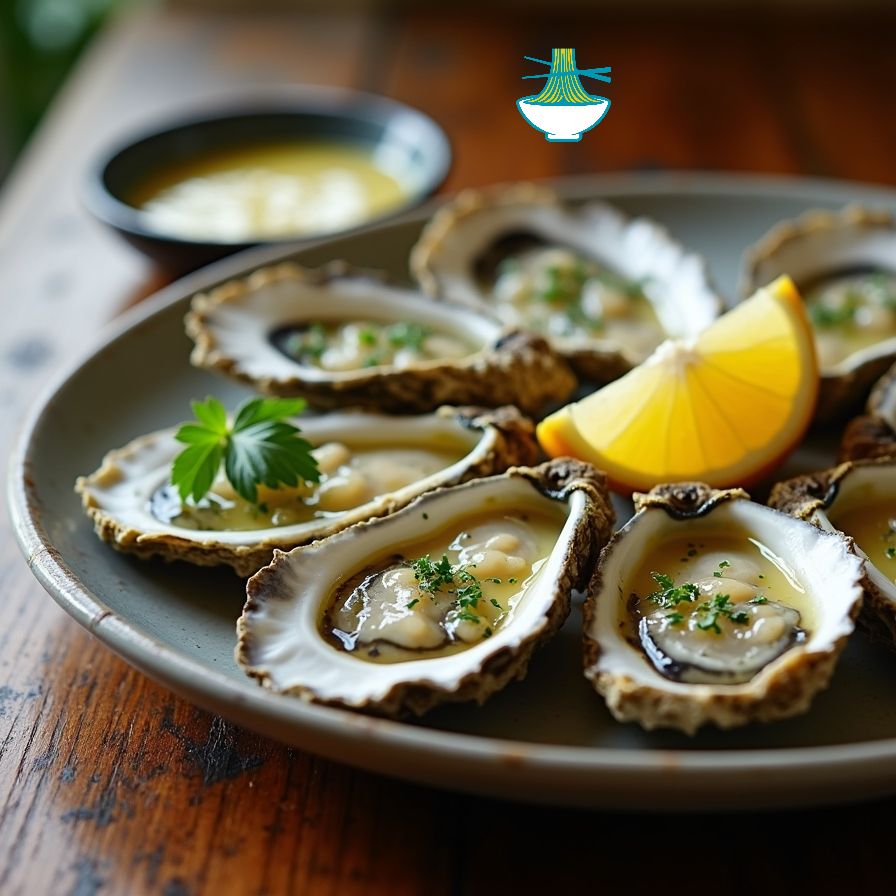This delicious oyster garlic butter recipe combines the briny, fresh taste of oysters with the rich, savory taste of garlic and butter to create a rich yet healthy dish. Not only does it deliver a rich flavor experience, but it also has a multitude of health benefits to go along with it. Oysters are rich in nutrients, including high-quality protein, healthy fats, and necessary minerals like zinc, which is beneficial in keeping testosterone levels balanced. Testosterone production is also accompanied by stress levels—constant stress can increase cortisol, which will lower testosterone, leading to fatigue, low libido, and other symptoms. This recipe, rich in zinc and other necessary nutrients, helps keep hormone levels and overall health in balance.
The recipe also contains significant vitamins such as Vitamin B12, which aids in the production of energy, and Vitamin C from the lemon and parsley, which stimulates immunity and assists in iron absorption. These vitamins synergistically support good health and are better absorbed when eaten with healthy fats, such as the butter in this recipe. Nourishing foods such as these can assist in breaking the cycle of stress and support your body during times of overwhelm.
If you wish to liberate yourself from stress and gain true happiness, remember that your well-being starts with small deliberate choices. Taking care of your body by eating right, relaxing, and remaining positive are simple but powerful measures against stress. The best advice I can offer is this: you can't do anything about what happens to you, but you can do something about how you respond. Creating a feeling of gratitude and embracing each moment can transform your experience regardless of what is occurring around you.
Ingredients:
- 12 freshly shucked oysters
- 3 tablespoons unsalted butter
- 4 garlic cloves (minced)
- 1 tablespoon lemon juice
- 1 tablespoon of fresh parsley chopped (optional)
- Salt and pepper according to taste
Method:
1. Prepare the Oysters:
- If you use oysters in their shells, shuck the oysters carefully first, and leave the oyster on the half shell. You can either bake the oysters or employ raw oysters in this dish, but this process is most effective with baked oysters.
2. Preheat Oven (if baking):
- Preheat your oven to 400°F (200°C).
3. Make Garlic Butter:
- Melt the butter in a small saucepan over medium heat.
- Add the minced garlic to the butter and cook it for 1-2 minutes until fragrant, but do not burn it.
- Combine the lemon juice and add a pinch of salt and pepper.
4. Prepare the Oysters:
- Arrange the shucked oysters on a baking sheet or in an oven-safe dish.
- Spoon the garlic butter mixture over each oyster generously.
5. Bake the Oysters (if baking):
- Place the oysters in the oven and bake for 10-12 minutes or until the oysters are cooked through and the butter is bubbly.
6. Garnish and Serve:
- Once baked, remove the oysters from the oven and garnish with fresh parsley if desired.
- Serve immediately with extra lemon wedges for an added kick.
Enjoy!
Garlic butter oysters are rich in nutrients and taste that can maintain testosterone levels and overall wellness.

What is Testosterone?
Testosterone is a basic hormone of the human body, typically associated with male development and health, although females also produce it in small percentages. It is needed for the development of the male sex organs such as the prostate and testes and also for triggering secondary sexual features such as increased body and muscle mass, hair, and deep voice. Testosterone is also crucial to maintain sexual function, energy, mood, and mental ability.
As men age, their levels of testosterone normally drop, but this hormone is critical in maintaining overall health, muscle, and bone strength. It also helps in fat regulation as well as red blood cell formation.
The Relationship Between Stress, Ruminating, and Testosterone
Stress, particularly chronic stress, can influence testosterone levels considerably. The body's typical response to stress is the activation of the hypothalamic-pituitary-adrenal (HPA) axis, which leads to the release of stress hormones such as cortisol. Cortisol, also known as the "stress hormone," is reported to suppress testosterone production. This is because the body initially responds to the stressor, and other processes such as regulation of hormones take a secondary role.
Overthinking, a prevalent symptom of psychological stress, tends to enhance the activating impact of stress. We stimulate the stress response further by overthinking, and this may lead to long-term cortisol levels. Elevated cortisol has the effect of inhibiting testosterone secretion, leading to muscle growth issues, mood, and energy. Chronic overthinking might lead to long-term stress, inducing long-term hormonal imbalance, such as reduced testosterone levels.
Overthinking and Stress: Key Terms
Notice: The following is taken from the book Stop Overthinking: 23 Techniques to Relieve Stress, Stop Negative Spirals, Declutter Your Mind, and Focus on the Present.
Overthinking is excessive analysis, judging, and worrying, which causes mental and physical distress. Overthinking generates anxiety, decision-making issues, and reduced productivity.
- Causes of Stress: Environmental factors, family history, past, and lifestyle can cause stress. Insecurities or stressful situations may lead to overthinking.
- Physical Effects: Faster heartbeat, headache, tension in muscles, stomach problems, and weakened immunity.
- Mental Effects: Fatigue, irritability, poor concentration, negative thinking, and even depression.
- Social Effects: Relationship conflicts, underperformance at work, and social isolation.
4 A's of Stress Management
- Avoid: Steer clear of stressful situations whenever possible. If you can eliminate a stressful person or circumstance, do so.
- Alter: Change your environment or your style of dealing with stressful situations. Inform others about what you require instead of suffering in silence.
- Accept: Accept those things which you cannot change, such as things in the past or events beyond your control. This does not imply condoning, but you stop resisting reality.
- Adapt: Shift your attitude and expectations. Learn to navigate through things and work with them rather than attempting to do it all.
Application: When under stress, pause and apply the 4 A's (Avoid, Alter, Accept, Adapt). This simple habit puts you back in charge and reduces stressful pressures in the moment.
Journaling for Stress Relief
- Write out your stress: Record when and why you were stressed, rate your stress level, and record how you handled it. This pinpoints causes and patterns.
- Gratitude Journaling: Write down things you're grateful for. It changes negative to positive thinking, diminishing stress and improving mental clarity.
Application: Keep a pocket journal with you and write down your stressors and thoughts. Look at it after a week to identify patterns and solutions.
5-4-3-2-1 Grounding Technique
This exercise helps you regain focus and relax. When you feel overwhelmed:
- Identify 5 things you can see.
- Identify 4 things you can touch.
- Listen for 3 things you can hear.
- Smell 2 things.
- Taste 1 thing.
Application: Use this grounding exercise whenever you find your mind racing. It helps to refocus your attention on the present moment and reduce the effect of overthinking.
Managing Your Time and Energy
- Prioritize tasks: Prioritize what is most important to you. Time management is not about accomplishing more, but about scheduling tasks in alignment with your values.
- Relaxation is the key: Schedule time for rest, leisure, and socializing. Break, even on workdays.
- Physical and emotional well-being: Sleep well, eat healthy, exercise, and have social and emotional support.
Application: Track your time usage for one week. Synchronize your schedule with your values and priorities so you are able to use time on most important things.
By applying these simple techniques, you can master stress, break overthinking, and take responsibility for your mind and emotional states.
Effects of Exogenous Testosterone on Stress Responses
This recent study investigated the effects of external, exogenous testosterone on the acute stress response in the body. The results of this study give us some insight into how testosterone interacts with stressors and the body’s response:
- Testosterone with Non-Social Stressors: When participants were exposed to a non-social stressor (cold-pressor test), testosterone raised systolic blood pressure. Is this the case because testosterone potentially amplifies a body's physiological response to stressors that aren’t related to social interactions, perhaps nudging the body toward a more active, fight-or-flight reaction?
- Testosterone and Social Stressors: Conversely, during a socially evaluative stressor (socially evaluated cold-pressor test), testosterone decreased systolic blood pressure, so it may lower social stress response. This can be explained through the fact that testosterone has earlier been seen to influence social self-confidence and ability to control aggression, which will act as protection from the bodily stress response to social conditions.
Notably, however, testosterone was discovered to affect blood pressure but not cortisol reactivity. This suggests that testosterone effects on stress responses are more to do with physiological reactions like blood pressure as opposed to the release of cortisol.
More Insights from Research on Testosterone and Stress
- Gender Differences: Studies have shown that men and women respond to stress differently in their testosterone levels. In men, stress, particularly in the instance of exams, can actually cause an extreme increase in testosterone. In women, on the other hand, stress can cause a decrease in testosterone, though these changes are not typically as extreme or consistent.
- Personality Traits and Stress Responses: Personality traits, such as extraversion and openness to experience, have been found to be associated with how people's testosterone levels respond to stress. People who are more extroverted tend to have lower testosterone levels in response to stress, while those who are more open may find their testosterone moderately increased. Emotional control, including aggression suppression and emotional inhibition, also plays a critical role in determining testosterone reactivity to stress.
- Impact of Chronic Stress: Chronic stress, with its persistent cortisol surge, exerts a long-term suppressive action on testosterone levels. This is part of the reason chronic stress may lead to decreased muscle mass, energy, and general vitality. Chronic stress may set the body up for fatigue, mood issues, and other disorders.
Testosterone's Role in Physical and Mental Health
- Apart from keeping muscles and bones healthy, testosterone plays a key part in ensuring mental and emotional health. Decline in levels of testosterone is related to decreased energy, depression, irritability, and an inability to focus. It maintains libido and sexuality too. Its wide-ranging action on both health conditions and psyche, testosterone requires levels to remain balanced for it to ensure optimum overall health.
Stress Management to Enhance Healthy Testosterone Levels
- Exercise: Exercise, especially strength training, has been shown to lower stress and enhance healthy testosterone levels. Exercise reduces cortisol levels and boosts mood and energy.
- Mindfulness and Meditation: Mindfulness, yoga, and meditation exercises can lower the negative impact of chronic stress. Relaxation and emotional control achieved through these exercises lower the impact of stress on testosterone and health in general.
- Sleep: Good sleep is essential in maintaining balanced hormones. Poor sleep increases cortisol, which can interfere with testosterone production. Sleeping 7-9 good hours per night assists in maintaining healthy levels of testosterone.
- Healthy Diet: A healthy diet rich in zinc, healthy fats, and proteins can help sustain testosterone secretion. Nuts like oysters, lean meat, and leafy greens can naturally enhance testosterone levels. Restricting excessive drinking and processed foods can also help maintain a balance of hormones.
- Social Support: A healthy support system can minimize the effects of stress. Social bonding can serve as a buffer to the effects of stress on mental health and thus testosterone levels.
Conclusion
Testosterone is vital for mental and physical health. The connection between stress, overthinking, and testosterone highlights the importance of stress management in achieving hormonal equilibrium. Both chronic and acute stress can influence testosterone levels, and stress can suppress testosterone production, especially when cortisol levels are increased over a sustained period. Through the use of effective stress management strategies such as exercise, mindfulness, and social support, we can maintain healthy testosterone levels and general well-being.
Frequently Asked Questions (FAQ) About Garlic Butter Oysters for Testosterone Boost
1. Can I use frozen oysters instead of fresh ones in this recipe?
- You can use frozen oysters, but fresh oysters will taste and feel better. If you must use frozen oysters, ensure that you thaw them completely in the fridge prior to cooking. Also, drain any excess water that may have formed when the oysters were frozen so that you do not end up with too much water in your meal.
2. What are the best methods for serving garlic butter oysters for a full meal?
- Garlic butter oysters may be served as an appetizer or accompanied by a side dish for a full meal. For a full meal, serve them with a fresh green salad, roasted vegetables, or even garlic mashed potatoes in a bowl. For added flavor and texture, toast some crusty bread to dip into the buttery garlic sauce.
3. How do oysters contribute to raising testosterone in this recipe?
- Oysters are rich in zinc, a mineral that is needed for testosterone production. Zinc is essential to keeping hormone levels balanced and healthy testosterone function. Consuming oysters in this garlic butter recipe provides a delicious and nutrient-dense answer to supporting your testosterone.
4. Can I make this recipe without butter for a dairy-free version?
- Yes! You can substitute the butter with a dairy-free alternative like olive oil, avocado oil, or coconut oil. These healthy fats will still provide a rich texture and flavor without the recipe being dairy-free. You may also attempt to use plant-based butter substitutes in order to have the same taste if you prefer.
5. Is it possible to add spices or herbs to the garlic butter oysters to enhance the flavor?
- Of course, you can add a boost in flavor by adding herbs like thyme, rosemary, or even tarragon to the garlic butter sauce. A dash of red pepper flakes or a dash of smoked paprika will provide it with a bit of kick. If you prefer it to be more citrusy, a lemon zest will brighten the dish even more. Experiment using your preferred herbs and spices to provide it with a personal touch that your taste buds will love!
Nutrition Value:
1. Fresh Oysters (12 shucked)
- Calories: 90-100 calories
- Carbohydrates: 6g
- Protein: 12g
- Fat: 2g
- Sodium: 500mg
- Cholesterol: 40mg
- Vitamins: High in Vitamin B12, Vitamin D, and some Vitamin A
- Minerals: High in zinc, iron, selenium, and magnesium
Nutritional Benefit: Oysters are an excellent source of protein, low in fat, and rich in minerals like zinc, which is important for immune function. They also provide a healthy dose of omega-3 fatty acids and help support cardiovascular health.
2. Unsalted Butter (3 tablespoons)
- Calories: 300 calories
- Carbohydrates: 0g
- Protein: 0g
- Fat: 33g
- Saturated Fat: 21g
- Sodium: 0mg
- Cholesterol: 80mg
- Vitamins: Contains Vitamin A and small amounts of Vitamin D
- Minerals: Trace amounts of calcium
Nutritional Benefit: Butter provides a rich source of saturated fat, which is a quick source of energy for the body, and it contains Vitamin A, which supports eye and immune health. However, it should be consumed in moderation due to its high saturated fat content.
3. Garlic (4 cloves, minced)
- Calories: 16 calories
- Carbohydrates: 3g
- Protein: 1g
- Fat: 0g
- Sodium: 1mg
- Cholesterol: 0mg
- Vitamins: High in Vitamin C
- Minerals: Contains small amounts of calcium, iron, and manganese
Nutritional Benefit: Garlic is known for its anti-inflammatory and immune-boosting properties. It also contains allicin, which may have cardiovascular benefits and help reduce cholesterol levels.
4. Lemon Juice (1 tablespoon)
- Calories: 4 calories
- Carbohydrates: 1g
- Protein: 0g
- Fat: 0g
- Sodium: 0mg
- Cholesterol: 0mg
- Vitamins: High in Vitamin C
- Minerals: Contains small amounts of potassium
Nutritional Benefit: Lemon juice is an excellent source of Vitamin C, an antioxidant that supports the immune system, helps the body absorb iron, and contributes to skin health.
5. Chopped Fresh Parsley (1 tablespoon, optional)
- Calories: 1-2 calories
- Carbohydrates: 0.5g
- Protein: 0.1g
- Fat: 0g
- Sodium: 1mg
- Cholesterol: 0mg
- Vitamins: Contains Vitamin A, Vitamin C, and Vitamin K
- Minerals: Contains small amounts of calcium, iron, and magnesium
Nutritional Benefit: Parsley is a good source of antioxidants, Vitamin C, and Vitamin K. It helps support immune function, bone health, and has anti-inflammatory properties.
6. Salt and Pepper (to taste)
- Calories: 0
- Carbohydrates: 0g
- Protein: 0g
- Fat: 0g
- Sodium: Varies depending on the amount used
- Cholesterol: 0mg
- Vitamins: None
- Minerals: Sodium in salt
Nutritional Benefit: Salt helps with electrolyte balance and nerve function but should be used in moderation to avoid excess sodium intake. Pepper has antioxidant properties and can aid in digestion.
Overall Nutritional Summary:
This dish provides a balance of protein from the oysters, healthy fats from the butter, and a variety of vitamins and minerals from garlic, lemon juice, and parsley. It is rich in zinc, Vitamin C, and omega-3 fatty acids, supporting immune health, heart health, and overall well-being. However, the butter adds a significant amount of saturated fat, so moderation is key in overall fat intake.
Resources
- Salivary Testosterone Levels Under Psychological Stress and Its Relationship with Rumination and Five Personality Traits in Medical Students
- Stress & Testosterone
- Testosterone, mood, behaviour and quality of life
- Salivary Testosterone Levels Under Psychological Stress and Its Relationship with Rumination and Five Personality Traits in Medical Students
- How Chronic Stress Impacts Your Testosterone Levels



Comments